Mae West

Born Mary Jane West Aug. 17, 1893
Kings County, New York.
Actress, singer, playwright, screenwriter, comedian
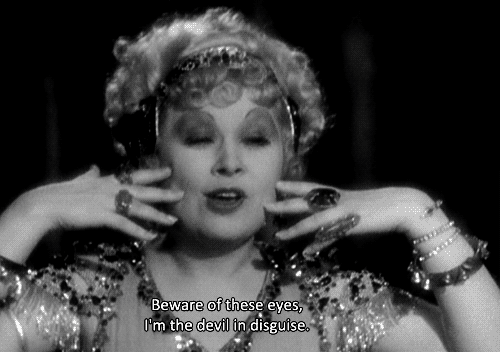
Mary Jane "Mae" West was an American actress, singer, playwright, screenwriter, comedian,
and sex symbol whose entertainment career spanned seven decades, known
for her lighthearted bawdy double entendres and breezy sexual independence.
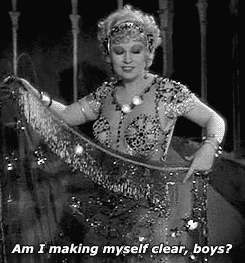

West was active in vaudeville and on the stage in New York City before moving to Hollywood to become a comedian, actress and writer in the motion picture industry, as well as appearing on radio and television. The American Film Institute named her 15th among the greatest female stars of classic American cinema.
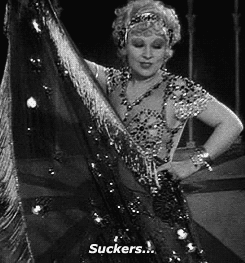
Often using a husky contralto voice, West was one of the more controversial movie stars of her day and encountered many problems, especially censorship. She bucked the system, making comedy out of conventional mores, and the Depression-era audience admired her for it. When her cinematic career ended, she wrote books and plays and continued to perform in Las Vegas, in the United Kingdom, on radio and television and to record rock and roll albums.
She was once asked about the various efforts to impede her career, to which she replied:
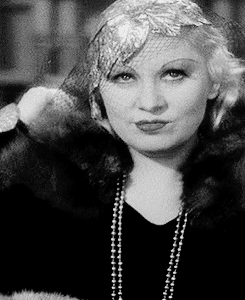
She was once asked about the various efforts to impede her career, to which she replied:
"I believe in censorship. I made a fortune out of it."

Mary Jane West was born on August 17, 1893, in Kings County, New York (either Greenpoint or Bushwick, before New York City was consolidated in 1898). She was delivered at home by an aunt who was a midwife. She was the eldest surviving child of John Patrick West and Mathilde "Tillie" (later Matilda) Delker (originally Doelger; later Americanized to "Delker" or "Dilker"). Tillie and her five siblings emigrated with their parents, Jakob (1835–1902) and Christiana (1838–1901; née Brüning) Doelger from Bavaria in 1886. West's parents married on January 18, 1889, in Brooklyn, to the pleasure of the groom's parents and the displeasure of the bride's parents and raised their children as Protestants, although John West was of mixed Catholic–Protestant descent and Tillie was of at least partial Jewish descent.
West was five when she first entertained a crowd at a church social, and she started appearing in amateur shows at the age of seven. She often won prizes at local talent contests. She began performing professionally in vaudeville in the Hal Clarendon Stock Company in 1907 at the age of 14. West first performed under the stage name "Baby Mae", and tried various personas, including a male impersonator.
Her trademark
walk was said to have been inspired or influenced by female
impersonators Bert Savoy and Julian Eltinge, who were famous during the Pansy Craze.
Her first appearance in a Broadway show was in a 1911 revue A La Broadway put on by her former dancing teacher, Ned Wayburn. The show folded after eight performances, but at age 18, West was singled out and discovered by The New York Times. The Times reviewer wrote that a "girl named Mae West, hitherto unknown, pleased by her grotesquerie and snappy way of singing and dancing". West next appeared in a show called Vera Violetta, whose cast featured Al Jolson. In 1912, she appeared in the opening performance of A Winsome Widow as a "baby vamp" named La Petite Daffy.
A pair of "trick" platform shoes worn by Mae West in films to make her look taller, which also contributed to her unique walk.
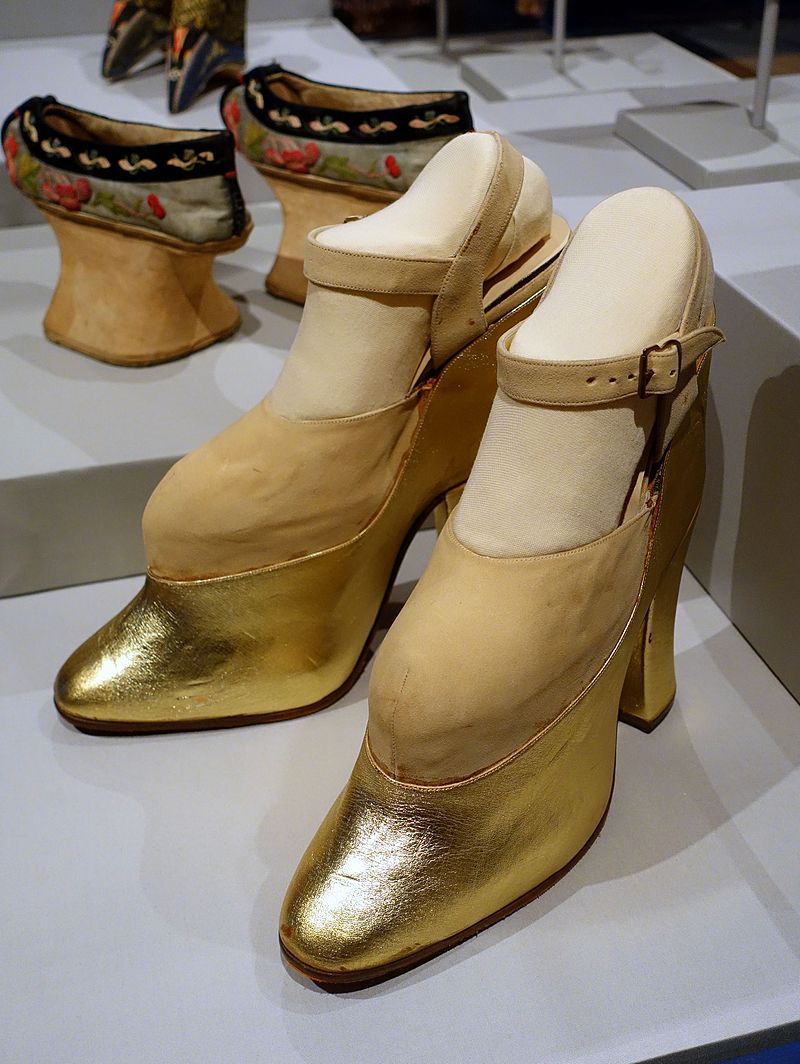

Her first appearance in a Broadway show was in a 1911 revue A La Broadway put on by her former dancing teacher, Ned Wayburn. The show folded after eight performances, but at age 18, West was singled out and discovered by The New York Times. The Times reviewer wrote that a "girl named Mae West, hitherto unknown, pleased by her grotesquerie and snappy way of singing and dancing". West next appeared in a show called Vera Violetta, whose cast featured Al Jolson. In 1912, she appeared in the opening performance of A Winsome Widow as a "baby vamp" named La Petite Daffy.
She was encouraged as a performer by her mother, who, according to West, always thought that anything Mae did was fantastic. Other family members were less encouraging, including an aunt and her paternal grandmother. They are all reported as having disapproved of her
career and her choices. In 1918, after exiting several high-profile revues, West finally got her break in the Shubert Brothers revue Sometime, opposite Ed Wynn. Her character Mayme danced the shimmy and her photograph appeared on an edition of the sheet music for the popular number "Ev'rybody Shimmies Now".
Eventually, she began writing her own risqué plays using the pen name Jane Mast. Her first starring role on Broadway was in a 1926 play she entitled Sex, which she wrote, produced, and directed. Although conservative critics panned the show, ticket sales were strong. The production did not go over well with city officials, who had received complaints from some religious groups, and the theater was raided, with West arrested along with the cast.
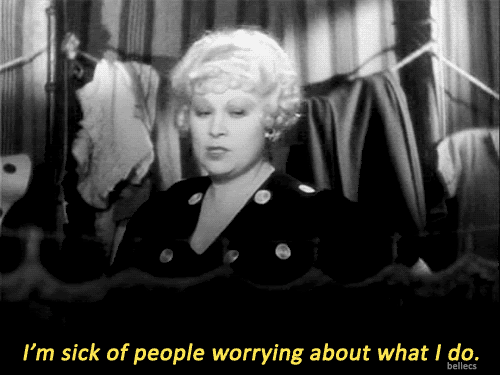 She was taken to the Jefferson Market Court House, (now Jefferson Market Library), where she was prosecuted on morals charges, and on April 19, 1927, was sentenced to 10 days for "corrupting the morals of youth". Though West could have paid a fine and been let off, she chose the jail sentence for the publicity it would garner. While incarcerated on Welfare Island (now known as Roosevelt Island), she dined with the warden and his wife; she told reporters that she had worn her silk panties while serving time, in lieu of the "burlap" the other girls had to wear. West got great mileage from this jail stint. She served eight days with two days off for "good behavior". Media attention surrounding the incident enhanced her career, by crowning her the darling "bad girl" who "had climbed the ladder of success wrong by wrong".
She was taken to the Jefferson Market Court House, (now Jefferson Market Library), where she was prosecuted on morals charges, and on April 19, 1927, was sentenced to 10 days for "corrupting the morals of youth". Though West could have paid a fine and been let off, she chose the jail sentence for the publicity it would garner. While incarcerated on Welfare Island (now known as Roosevelt Island), she dined with the warden and his wife; she told reporters that she had worn her silk panties while serving time, in lieu of the "burlap" the other girls had to wear. West got great mileage from this jail stint. She served eight days with two days off for "good behavior". Media attention surrounding the incident enhanced her career, by crowning her the darling "bad girl" who "had climbed the ladder of success wrong by wrong".

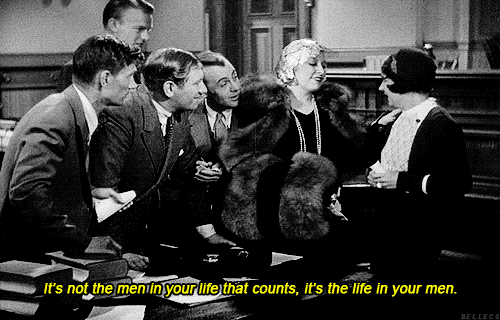
Her next play, The Drag, dealt with homosexuality, and was what West called one of her "comedy-dramas of life". After a series of try-outs in Connecticut and New Jersey, West announced she would open the play in New York. However, The Drag never opened on Broadway due to efforts by the New York Society for the Suppression of Vice
to ban any attempt by West to stage it. West explained, "The city fathers begged me not to bring the show to New York because they were not equipped to handle the commotion it would cause." West was an early supporter of the women's liberation movement, but said she was not a "burn your bra" type feminist.
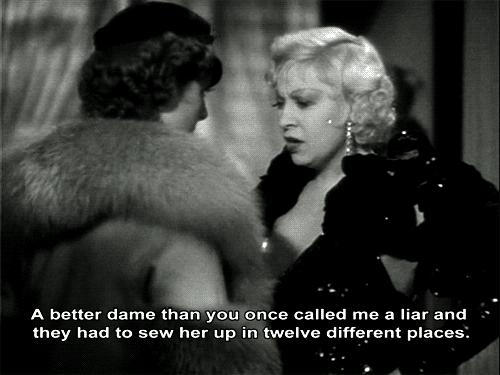
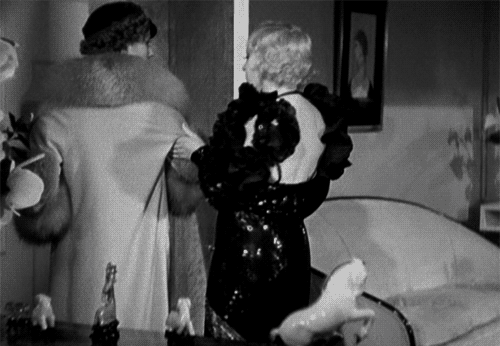 Since the 1920s, she was also an early supporter of gay rights. In her 1959 autobiography, Goodness Had Nothing to Do With It, West strongly objected to hypocrisy while also disparaging homosexuality: “In many ways homosexuality is a danger to the entire social system of Western civilization. Certainly a nation should be made aware of its presence - without moral mottoes - and its effects on children recruited to it in their innocence. I had no objection to it as a cult of jaded inverts... involved only with themselves. It was its secret, anti-social aspects I wanted to bring into the sun. As a private pressure group it could, and has, infected whole nations."
Since the 1920s, she was also an early supporter of gay rights. In her 1959 autobiography, Goodness Had Nothing to Do With It, West strongly objected to hypocrisy while also disparaging homosexuality: “In many ways homosexuality is a danger to the entire social system of Western civilization. Certainly a nation should be made aware of its presence - without moral mottoes - and its effects on children recruited to it in their innocence. I had no objection to it as a cult of jaded inverts... involved only with themselves. It was its secret, anti-social aspects I wanted to bring into the sun. As a private pressure group it could, and has, infected whole nations."


West continued to write plays, including The Wicked Age, Pleasure Man and The Constant Sinner.
Her productions aroused controversy, which ensured that she stayed in the news, which also often resulted in packed houses at her performances. Her 1928 play, Diamond Lil, about a racy, easygoing, and ultimately very smart lady of the 1890s, became a Broadway hit and cemented West's image in the public's eye. This show had an enduring popularity and West successfully revived it many times throughout the course of her career. With Diamond Lil being a hit show, Hollywood naturally came courting.
Motion pictures and censorshipIn 1932, West was offered a motion picture contract by Paramount Pictures despite being close to 40. This was an unusually late age to begin a movie career, especially for women, but she was not playing an ingénue. She nonetheless managed to keep her age ambiguous for some years. She made her film debut in
Night After Night (1932) starring
George Raft, who suggested her for the role. At first she did not like her small role in Night After Night, but was appeased when she was allowed to rewrite her scenes. In West's first scene, a hat-check girl exclaims, "Goodness, what beautiful diamonds", and West replies, "Goodness had nothing to do with it, dearie." Reflecting on the overall result of her rewritten scenes, Raft is said to have remarked, "She stole everything but the cameras."
She brought her Diamond Lil character, now renamed "Lady Lou", to the screen in She Done Him Wrong (1933). The film was one of Cary Grant's first major roles, which boosted his career. West claimed she spotted Grant at the studio and insisted that he be cast as the male lead. She claimed to have told a Paramount director "If he can talk, I'll take him!"
She Done Him Wrong is a 1933 pre-Code American crime/comedy film starring Mae West and Cary Grant. The plot includes melodramatic and musical elements.
The film is famous for West's many double entendres and quips, including her best-known (and frequently misquoted), "Why don't you come up sometime and see me?"
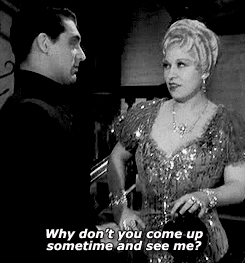
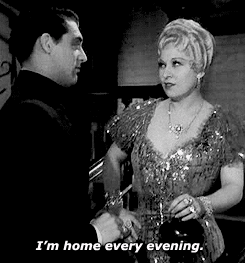
The film was adapted from the successful Broadway play Diamond Lil by Mae West. The Hays Code declared the play banned from the screen and repeatedly demanded changes to remove associations with or elements from the play, including suggested titles with the word "diamond". The adaption was finally allowed under the condition that the play not be referred to in publicity or advertising.
Blonde Venus (with Marlene Dietrich) and Madame Butterfly (with Sylvia Sidney), both predate She Done Him Wrong but West always claimed to have discovered Grant for her film, claiming that until then Grant had only made "some tests with starlets".
Charles Lang was responsible for the cinematography, while the costumes were designed by Edith Head.
Her next release, I'm No Angel (1933), teamed her with Grant again. I'm No Angel was also a financial success, and was the most successful film of her entire movie career. In the months that followed the release of this film, reference to Mae West could be found almost anywhere, from the song lyrics of Cole Porter, to a Works Progress Administration (WPA) mural of San Francisco's newly built Art-Deco Coit Tower, to She Done Him Right, a Betty Boop cartoon, to "My Dress Hangs There", a painting by Mexican artist Frida Kahlo. Kahlo's muralist painter husband, Diego Rivera, paid his own tribute: "West is the most wonderful machine for living I have ever known – unfortunately on the screen only." To F. Scott Fitzgerald, Mae West was especially unique: "The only Hollywood actress with both an ironic edge and a comic spark." As Variety
put it, "Mae West's films have made her the biggest conversation-provoker, free-space grabber, and all-around box-office bet in the country. She's as hot an issue as Hitler."
By 1933, West was one of the largest box office draws in the United States and, by 1935, West was also the highest paid woman and the second-highest paid person in the United States (after William Randolph Hearst). Hearst invited West to San Simeon, California.
"I could'a married him," West explained, "but I got no time for parties. I don't like those big crowds." On July 1, 1934, the censorship of the Production Code began to be seriously and meticulously enforced, and her screenplays were heavily edited. West would purposely place over-the-top lines in her scripts, knowing the censors would cut them out. She hoped they would then not object as much to her other lines. Her next film was Belle of the Nineties (1934). The original title, It Ain't No Sin, was changed due to the censors' objections. Despite Paramount's early objections regarding costs, she insisted the studio hire Duke Ellington
and his orchestra to accompany her in the film's musical numbers. Their collaboration was a success; the classic "My Old Flame" (recorded by
Duke Ellington) was introduced in this picture. Her next film, Goin' to Town (1935), received mixed reviews, as censorship continued to take its toll in eroding West's best lines.
Mae West was a shrewd investor, produced her own stage acts, and invested her money in large tracts of land in Van Nuys,
a thriving suburb of Los Angeles. With her considerable fortune, she could afford to do as she liked. In 1976, she appeared on Back Lot U.S.A. on CBS, where she was interviewed by Dick Cavett and sang "Frankie and Johnny" along with "After You've Gone." That same year, she began work on her final film, Sextette
(1978). Adapted from a 1959 script written by West, the film's daily revisions and production disagreements hampered production from the beginning. Due to the near-endless last-minute script changes and tiring production schedule, West agreed to have her lines signaled to her through a speaker concealed in her hair piece. Despite the daily problems, West was, according to Sextette director Ken Hughes, determined to see the film through. At 84, her now-failing eyesight made navigating around the set difficult, but she made it through the filming, a tribute to her self-confidence, remarkable endurance, and stature as a self-created star 67 years after her Broadway debut in 1911 at the age of 18. Time magazine wrote an article on the indomitable star entitled "At 84, Mae West Is Still Mae West".
Upon its release, Sextette was not a critical or commercial success, but has a diverse cast. The cast included some of West's first co-stars such as George Raft (Night After Night, 1932), silver screen stars such as Walter Pidgeon and Tony Curtis, and more contemporary pop stars such as The Beatles' Ringo Starr and Alice Cooper, and television favorites such as Dom DeLuise and gossip queen Rona Barrett. It also included cameos of some of her musclemen from her 1950s Las Vegas show, such as the still remarkably fit Reg Lewis. Sextette also reunited Mae West with Edith Head, her costume designer from 1933 in She Done Him Wrong.
In August 1980, West tripped while getting out of bed. After the fall she was unable to speak and was taken to Good Samaritan Hospital in Los Angeles, where tests revealed that she had suffered a stroke. She died on November 22, 1980, at the age of 87.
A private service was held in the Old North Church replica, in Forest Lawn, Hollywood Hills, on November 25, 1980. Bishop Andre Penachio, a friend, officiated at the entombment in the family mausoleum at Cypress Hills Abbey, Brooklyn, purchased in 1930 when her mother died. Her father and brother were also entombed there before her, and her younger sister, Beverly, was laid to rest in the last of the five crypts less than 18 months after West's death.
For her contribution to the film industry, Mae West has a star on the Hollywood Walk of Fame at 1560 Vine Street in Hollywood. For her contributions as a stage actor in the theater world, she has been inducted into the American Theater Hall of Fame.
West family crypt at Cypress Hills Cemetery, with Mae at top
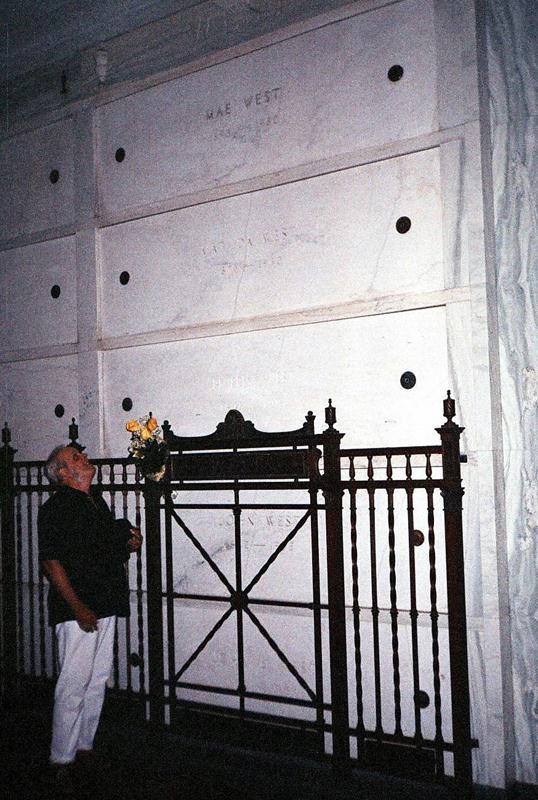
Cypress Hills Cemetery was the first non-sectarian/non-denominational cemetery corporation organized in the boroughs of Brooklyn and Queens in New York City. The Cemetery is run as a non-profit organization and is located at 833 Jamaica Avenue in Brooklyn. The Cemetery occupies both boroughs, and its 225 acres are divided by the Jackie Robinson Parkway. Cypress Hills Cemetery retains its two primary entrances at Jamaica Avenue (Cypress Hills, Brooklyn) and Cooper Avenue (Glendale, Queens).

Mae West (August 17, 1893 – November 22, 1980)

No comments:
Post a Comment